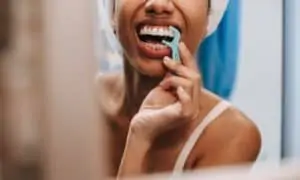General Dentistry

Why Do People Grind Their Teeth While Sleeping?
According to the Sleep Foundation, nocturnal teeth grinding still isn’t entirely understood, even with the advanced technology and treatments available in dental and regular medicine today. However, many contributing factors can lead to nighttime grinding that can include:
- Increased daytime stress
- Anxiety and depression
- Frustration and anger
- Caffeine or alcohol consumption
- Tobacco use
You’ll want to discuss what medications you’re taking with your dentist in Sparks. Certain pills, such as antidepressants, can lead to teeth grinding.
How Does Teeth Grinding Impact My Health?
Forget about the constant disruptions to your sleep cycle that are keeping you from getting the rest you need; bruxism can be bad for your teeth and cause severe pain. When you chronically grind your teeth, it wears down your enamel. When you lose your precious tooth enamel this can result in:
- Increased sensitivity
- Discolorations
- Deterioration and decay
- Chips or breaks
What’s worse, your grinding and clenching can also cause issues with your temporomandibular joint or TMJ joining resulting in pain and loss of functionality.
How to Treat Nighttime Teeth Grinding
Your dentist in Sparks will take the first step in helping you find relief from your bruxism by trying to determine the underlying cause of it. Is it stress or anxiety that’s causing your grinding? Is it another condition called sleep apnea contributing to your issue? If you or someone in your family has constant or persistent pain in your mouth, neck, and jaw from grinding, it’s time to talk with us. You’re experiencing this discomfort because you probably don’t even realize you’re grinding your teeth while you’re sleeping. This puts a tremendous amount of pressure on your teeth, with up to 250 pounds of force, leading to headaches and so much more.
Grinding your teeth is not 100 percent curable, but there are ways to:
- Reduce how often it’s happening
- Decrease the amount of impact it has
- Relieve your stress and symptoms
It’s important to speak with a professional about sleep bruxism and teeth grinding because we can also identify if it’s connected to other conditions like sleep apnea or acid reflux. We’ll find answers to your questions and figure out what solution will be best for you. You might benefit from a custom-fitted nightguard that will help to protect your smile from further damage while you work on a treatment plan.
Are you ready to get help? Contact us today to schedule a consultation so we can address your questions and help you heal.

Don’t Forget to Take Your Toothbrush
Are you traveling this summer for a luxurious vacation? Whether you’re headed out on a road trip, camping outdoors, or staying with friends and family, there’s one vital thing you don’t want to miss when you’re packing, and that’s your toothbrush. No matter where you are in the world, you’ll still want to take time to brush your teeth two or three times a day while also flossing at least once. There are so many stores that offer travel-sized toothbrushes and tubes of toothpaste; they make it easier to throw them in your suitcase or backpack and go!
Don’t Use Your Teeth as Tools
We always want to remind our patients that their teeth are strong, but they’re not strong enough to be used as tools. You can end up with a tooth that’s chipped or broken because you tried to use it to open a bottle, wrapper, chip bag, etc. (you know what we mean.) Your Sparks dentist knows how easy it is to rip open that annoying plastic with your teeth quickly, but it could come with unexpected or unwanted consequences.
Don’t Go Overboard With Sugar
While summer is a fun time to indulge, especially when you’re on vacation, it’s important to fill your body with good foods to support optimal oral and overall health. Some foods actually help clean your teeth naturally and can be a good choice for summer snacking, such as:
- Apples
- Carrots
- Celery
Foods like these are often referred to as “nature’s toothbrushes.” They are also full of vitamins and minerals that your body needs to function correctly. There’s no substitute for a real brushing, though, so don’t forget to use your toothbrush and toothpaste whenever and wherever possible.
Don’t Forget Your Sunscreen
One place people tend to forget to cover is their lips. Always apply a lip balm with a sun protection factor or SPF of at least 15. This is essential because your lips are very sensitive and susceptible to getting sunburnt, just like the rest of your body. Don’t forget to wear plenty of sunscreen and stay hydrated with water when outside this summer.
As your dentist in Sparks, we want you to know that we hope you and your family can take some time for a vacation this summer. Enjoy every minute of what the season has to offer. If you need to schedule a cleaning or have any questions for us, please don’t hesitate to give us a call, and we’ll talk.

Different Types of Mouthwash
Mouthwash can be a helpful addition to your oral hygiene routine as it can help kill mouth bacteria that could otherwise lead to cavities and other problems. While there are a variety of different types of mouthwash available, most over-the-counter options aim to kill these bacteria and prevent decay. It’s important to note that some mouthwash is alcohol-based, and others are non-alcohol-based.
- Alcohol-Based
If your mouthwash gives you that burning sensation when you rinse with it — it most likely contains alcohol. Alcohol-based mouthwash may seem like it’s working better because of this tingling, but that’s not necessarily true.
- Non-Alcohol-Based
Some patients find the feeling of alcohol-based mouthwash too intense. A good alternative for this would be a non-alcohol-based mouthwash. These products can still help remove bacteria just without the burn.
If you choose to use mouthwash, make sure you choose one with the ADA Seal of Acceptance. Additionally, your dentist in Sparks can recommend the best mouthwash for you.
The Best Way to Use Mouthwash
Mouthwash can be used every day if instructed by your dentist. However, make sure to also follow the instructions on your specific product, including how often to use it and how much to use. Keep in mind, mouthwash isn’t recommended for children under six years of age as they may not have the proper mechanics to swish and spit effectively.
Mouthwash Isn’t a Substitute for Brushing
Even though rising with mouthwash can further kill off bacteria, it is not meant to substitute for brushing and flossing. Mouthwash isn’t designed to be used on its own to keep teeth decay-free. It’s still important to brush and floss your teeth daily, as well as see your dentist in Sparks at least twice a year for professional cleanings and exams.
Signs You Should Stop Using Mouthwash
While most patients shouldn’t experience any side effects of mouthwash, it is possible. Here are some signs that you should stop using mouthwash and talk with your dentist in Sparks:
- Dry mouth
- Teeth staining
- Sensitivity after using the mouthwash
- Canker sores or mouth sores
If you do experience any of these side effects, discontinue use and talk with your dentist. Additionally, if you have known allergies, make sure to check labels carefully before purchasing.
Your dentist is here to help you make the best decisions about your oral health. Make sure you talk about any concerns you have about using mouthwash at your next appointment. We’re always happy to help.

What Is a Cavity?
Cavities are so common in the United States that the CDC says 90% of Americans over the age of 20 have had at least one cavity in their lifetime. These tiny areas of tooth decay, if left untreated, will only become bigger and deeper and also become more difficult to treat. Cavities begin as a small hole or pit in a tooth where acid or bacteria has attacked the enamel. During this stage, cavities can easily be fixed with a filling from your dentist in Sparks. However, cavities that continue to progress can sometimes require more complex treatment such as a root canal or even tooth extraction.
Surprising Things The Cause Cavities
We’ve already shared that many people think cavities are a problem of eating too much sugar, and while that may be the case, there are other reasons why a cavity develops.
- Dry Mouth
If a patient’s mouth is dry it’s more likely that they will have cavities. Usually, saliva will help neutralize acids and rinse away bacteria that can cause cavities. But when saliva production is too low and the mouth feels too dry, bacteria and acids are left lingering around to cause damage to the enamel and, you guessed it, cause cavities.
- Carbohydrates & Acids
Besides sugar, there are other foods that can increase the risk of cavities. The two most concerning are acidic foods, such as citrus fruits and foods with a lot of carbohydrates. Acidic foods and drinks further aid in the mouth acid’s ability to weaken enamel while carbs fuel the bacteria, allowing them to thrive.
- Bad Brushing or Flossing
There are many reasons why it’s important to brush your teeth twice a day and floss once a day, but one of the main reasons is to prevent cavities. Brushing your teeth in the morning and at night will remove plaque and plaque acids that have built up throughout the day. Flossing reaches those tricky areas that a toothbrush can’t reach and where cavities are more likely to develop.
Cavity Symptoms
Patients may experience different symptoms, but some of the most common signs of a cavity include:
- Pain when you bite
- Tooth sensitivity
- Brown, black, or white spots
- Toothache
- Pits or holes in a tooth
If you think that you may have a cavity, call your dentist in Sparks to schedule an appointment.
Even though cavities are incredibly common, there are things you can do to reduce your risk of getting one. Make sure you brush and floss your teeth regularly, limit your intake of sugary, acidic, or high-carbohydrate foods, and drink plenty of water daily. Of course, you should also see your dentist every six months for a checkup.

Things That Require A Dental Appointment
The environment in the mouth is ever-changing, and there are times when these changes can spark concern and have you wondering if you should schedule a dental appointment. Let’s take a look at some of the most common symptoms that should warrant a visit to your Sparks dentist.
- Bad Breath
Temporary bouts of bad breath are bound to happen, especially if you eat something particularly fragrant such as garlic or onions. However, if bad breath lingers and doesn’t go away even after you brush your teeth, it may be a sign of something serious. Bad breath could mean gum disease, dry mouth, or even kidney problems.
- Mouth Sores
Mouth sores including ulcers can be annoying and sometimes embarrassing. Many times they are harmless and should go away on their own. However, if they don’t heal within two weeks or get worse, it’s time to see your dentist. Mouth sores that don’t heal may be a sign of oral cancer or other problems.
- Sensitivity
Tooth sensitivity can trigger shooting pains through your teeth, which is pretty uncomfortable. If you have sensitivity to hot or cold foods or drinks, especially if it’s new for you, you should see your dentist in Sparks. This can be a sign of decay, weakened tooth enamel, or a chipped or cracked tooth.
- Bleeding or Swollen Gums
Gums shouldn’t bleed when you brush or floss your teeth. They also shouldn’t be inflamed or swollen. However, those with gum disease may experience red, painful, swollen gums. It’s important to have this checked out by your dentist as gum disease can lead to other problems throughout the body such as an increased risk of heart disease.
- Pain
Pain anywhere in or around the mouth may require a visit to the dental office. From a toothache that can make it difficult to chew to a painful jaw that hurts to open and close, pain around the mouth shouldn’t be taken lightly and is usually a sign telling you that something isn’t quite right. See your dentist quickly.
If you notice any of the signs above, schedule an appointment with your dentist in Sparks as soon as possible to get relief.

Types of Bad Breath
There are different types of bad breath, also called halitosis, and different smells can mean different things.
- Sweet & Fruity – Even though sweet and fruity doesn’t sound like a way to describe bad breath, it’s actually a sign of something very serious. Sweet or fruity breath can indicate ketoacidosis or kidney failure.
- Fishy – Breath that smells like fish can also be a sign of kidney trouble.
- Rotten Eggs – This smell can indicate that there’s something wrong with the digestive tract such as GERD.
- Moldy – Breath that smells a bit moldy is most common in those who have a sinus infection.
Other Causes of Bad Breath
While there are certainly several serious conditions that can cause bad breath, oftentimes bad breath is a symptom of something going in the mouth.
Poor Dental Hygiene
The most common underlying cause of bad breath is a buildup of bacteria in the mouth. This can occur when someone has poor dental hygiene. Your Sparks dentist always recommends brushing your teeth twice a day and flossing once a day to remove bacteria. However, when this isn’t done regularly, bacteria can linger around and cause bad breath. Make sure you’re brushing your teeth twice a day for two minutes and taking the time to floss in between each tooth.
Gum Disease
Another top cause of bad breath is gum disease. Gum disease is a serious problem that can lead to tooth loss and other problems throughout the body such as the increased risk of stroke, heart disease, and respiratory complications. Gum disease, also known as periodontal disease, is caused when bacteria find their way into the gum tissue and hide out. These bacteria can be tricky to remove. This buildup of bacteria can once again lead to foul breath. Gum disease needs to be treated quickly or it will be irreversible. This is just one of the reasons why it’s so important to see your dentist in Sparks every six months.
Dry Mouth
Dry mouth can result in much more than that gross, annoyingly dry feeling. It can also cause bad breath and other dental problems. Dry mouth results from a lack of saliva production. Saliva is what typically helps wash away bacteria and neutralize acids in the mouth. Without enough of it, bacteria tend to linger around and can emit an unpleasant odor. There are several things that can cause dry mouth including certain medicines or dehydration. Your dentist in Sparks recommends drinking plenty of water throughout the day and reviewing your medications and side effects with your medical doctor.
Chronic bad breath should be taken seriously. So if you find yourself shying away from talking to people because you’re embarrassed by the way your breath smells, schedule an appointment with your dentist as soon as you can.

Demineralization
Demineralization is one of the more common causes of white spots in adults. It happens when too many bacteria build up teeth and are left there over time. These bacteria can weaken and wear away tooth enamel, increasing the likelihood of developing cavities as well as white or brown spots on teeth. Your dentist in Sparks will want to pay particular attention to these white spots as the risk of cavities becomes greater. However, if your teeth remain cavity-free but the spots remain, you may be a good candidate for a professional smile whitening treatment or porcelain veneers to cover up the uneven coloration.
Enamel Hypoplasia
This cause of white spots is more common in childhood but can also occur in adults. It can be caused by a number of factors such as certain medications or medical conditions, dental trauma, diabetes, and other illnesses. As with demineralization, enamel hypoplasia can weaken enamel and make cavity development more likely. Your dentist in Sparks will want to observe these areas to monitor any changes or the appearance of decay. Treatment for spots caused by enamel hypoplasia could also be tooth whitening or porcelain veneers.
Fluorosis
Fluorosis most commonly occurs during childhood, but the white spots that result can follow you into adulthood. Fluoride treatments are recommended for most kids and even some adults to help strengthen enamel and reduce the risk of cavities. However, even though fluoride is safe, if someone gets too much of it during childhood, fluorosis and white spots can develop. Again, your dentist may be able to cover up these areas through tooth whitening or veneers.
Diet
Eating a healthy, well-balanced diet is important for overall health, but it’s also crucial for optimal dental health. Our teeth, and our bones, need calcium and vitamin D to remain strong. Without enough of these, teeth can develop white spots simply because the enamel is more likely to weaken. You should make sure to eat plenty of calcium-rich foods such as dairy products, leafy green vegetables, beans, and even calcium-fortified foods.
If you’re bothered by white spots on your teeth, we encourage you to talk with your dentist in Sparks about the many cosmetic dentistry options available to transform your teeth. Additionally, make sure you do everything you can to avoid white spots from popping up in the first place including brushing your teeth and flossing every day and eating a well-balanced diet.

Signs of Gum Disease
First and foremost, it’s important to know and recognize the signs of gum disease so that if you suspect a problem you can see your dentist in Sparks as soon as possible. Gum disease can be treated effectively, but treatment is more successful when the disease is in the early stages. Some of the most common signs of gum disease include:
- Gums that bleed while brushing or flossing
- Bad breath that doesn’t go away
- Puffy, painful gums
- Bright red or purplish gums
- Loose teeth
- Gum recession
- Changes in your bite or spaces between teeth
What Causes Gum Disease?
Most cases of gum disease are related to poor oral hygiene habits. Gum disease develops when plaque hardens on teeth, called tartar. Tartar is packed with bacteria that can cause more damage the longer the tartar sticks around. Additionally, tartar can’t be removed at home. Once plaque hardens into tartar, it must be removed through a professional dental cleaning.
What Does Gum Disease Have to Do With Heart Health?
Even though gum disease sounds like a mouth problem, it can actually affect the rest of the body, too. A study released last year from researchers at the Harvard School of Dental Medicine and the Forsyth Institute showed that active gum disease was an early risk factor in the patients studied who went on to have a heart attack. But why? Luckily, the researchers explained this as well and tied the increased risk of a cardiovascular event to inflammation. Gum inflammation can cause inflammation elsewhere in the body, such as the arteries, which increases the risk of a heart attack.
How to Prevent Gum Disease and Lower Risk of a Heart Attack
There are things you can do to reduce the risk of developing gum disease and, in turn, lower the risk of a heart attack. First, make sure to brush your teeth every day, twice a day, for two minutes each time. Also, don’t forget to floss at least once a day. Next, see your dentist in Sparks at least every six months for checkups and cleanings. These regular checkups allow your dental team to remove any plaque that has accumulated since your last visit and monitor your oral health for any changes. After all, early intervention often means a better outcome.
If it’s been longer than six months since your last dentist appointment, we welcome you to call and schedule an appointment today.

Traditional Floss
Traditional string dental floss is the most common and oldest form of flossing available. It’s been available since the 1800s and, even though there are various forms of string floss, it’s a tried and true method of cleaning in between your teeth. In fact, your dentist in Sparks probably uses this at your hygiene appointments.
Benefits
Traditional string floss has several benefits, which is probably why it’s so popular. Most commonly, string floss is easy. It’s:
- Easy on your wallet
- Easy to use
- Easy to travel with
- Easy to store
Potential Cons
Even though this type of floss has been around for centuries, there are some potential cons. Some people, such as those with braces or arthritis, may find string floss hard to use. Also, if people floss too hard with traditional floss they can damage their gum tissue and cause sensitivity or recession.
Floss Picks
Those who find traditional floss difficult to use might turn to floss picks. While these are better than not flossing at all, they may not provide the best clean.
Potential Cons
Floss picks provide only a small amount of floss in the stretched, straight line. This keeps people from using a clean section of floss in between each tooth section. Additionally, string floss allows patients to curve the floss around the tooth, thoroughly cleaning it. Floss picks don’t curve as effectively, inhibiting how much of the tooth can be cleaned.
Water Flossers
Now, there is another effective option on the market in the form of water flossers. There’s some debate in the dental world as to whether water flossers or traditional floss is the best form of floss. Your dentist in Sparks says the best floss is the floss that’s used. Water flossers are great at removing buildup between the teeth and may be appropriate for some patients.
Potential Cons
While water flossers may be an excellent choice for those who find traditional string floss hard to use, there are some downsides. Water flossers are more expensive than other forms of floss. They’re also not exactly travel-friendly and can take up space on your bathroom counter.
As you can see, there are pros and cons to each type of floss. To find the best floss for you, we recommend talking to your dentist in Sparks.

Let’s Talk Tooth Sensitivity
Have you ever had a cold or hot beverage that made your teeth feel funny? This is something we call tooth sensitivity, and it’s actually a normal side effect after you’ve completed dental work like cavity fillings, tooth extractions, or dental implants. Why does tooth sensitivity lead to dental pain? It’s due to nerve inflammation inside your tooth or teeth. If you have pain or tooth sensitivity that persists for weeks or even months after you’ve seen your Sparks dentist, you’ll want to schedule an appointment to have them take a look at your teeth to see if something needs further attention.
It’s All About Pressure
When unwanted discomfort occurs after a filling or any dental treatment, you’re probably wondering why. It turns out the answer to this question is simple — it’s pressure. After your filling is permanently in place, the piece of your tooth that was damaged by bacteria is now filled in, adding new pressure to the area. This can change how air and saliva move across your tooth, causing sensitivity.
What You Can Do to Feel Better
You can take some steps at home to help you feel better if you have dental discomfort or pain post-procedure. Try taking some Advil, Ibuprofen, or Aleve. Be sure to follow the recommended dosage directions and instructions. Applying a cold compress on your cheek or jaw to minimize pain. Are you also wondering how to manage sensitivity in your teeth due to cracks and damages to a filling? Maintaining optimal dental health should still be your top priority, and you want to:
- Use a toothpaste specially designed for sensitive teeth
- Brush and floss regularly every day
- Gargle using warm, salty water
The right thing to do if you’re experiencing any pain, discomfort, or sensitivity is to schedule a visit right away at our Sparks dental office. We can help you feel better and determine what’s causing your issues so we can get to the root of the pain. If you have any questions or concerns, please feel free to call our office today and chat with us. We’re always here to help and look forward to hearing from you!
